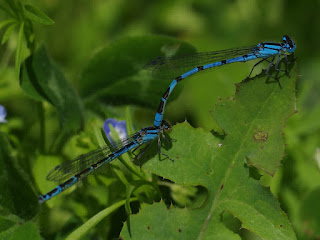Another scene of repeated failure and dogged persistence, the nest at the Serpentine outflow. The pair are now on their third attempt. Well, they did manage to raise one chick last year, so it isn't quite as futile as the nest on the post.
The two Pochard ducklings on the Long Water have survived another day. The family was retreating from an irresponsible dog owner who was throwing sticks into the lake for his pet to retrieve.
The Mute Swan cygnet on the Serpentine and its mother cruised by.
(You can see the one on the Long Water in the grebe video above.)
The young Grey Heron that lives in the Dell prowled around in the little stream looking for a fish.
There was a loud clattering sound of the heron chick begging in the new nest on the island.
Quite a lot of Black-Headed Gulls have now returned from their breeding grounds. It looks as if these have all been unsuccessful, and this year's young birds will arrive later.
The Little Owl near the Albert Memorial enjoyed the sunshine in her customary oak tree.
The usual Blackbird flew into the Italian Garden for his daily treat of sultanas.
This very young Great Tit was on the steps of the basement area of the house next to my flat. It had flown across from a nest on the other side of the street, and was cheeping miserably. The gate was locked and I couldn't catch it to bring it back. However, when I arrived there had been two of them here, and the other one flew back home. I hope this one managed too.
A Red Admiral butterfly perched on a leaf beside the Long Water.
I also saw two Marbled Whites near the Serpentine Gallery, but couldn't get a picture of either. Maybe tomorrow.
Female Common Blue Damselflies come in two colours, greenish-grey ...
... and the same blue as the male. She is on the right in this picture. Note the 'Christmas tree' marking on the second-last long segment of the abdomen.
A Greenbottle fly shone in the sunlight.
There was a service of remembrance at the Bomber Command memorial in Piccadilly, and a Lancaster circled several times.


























































